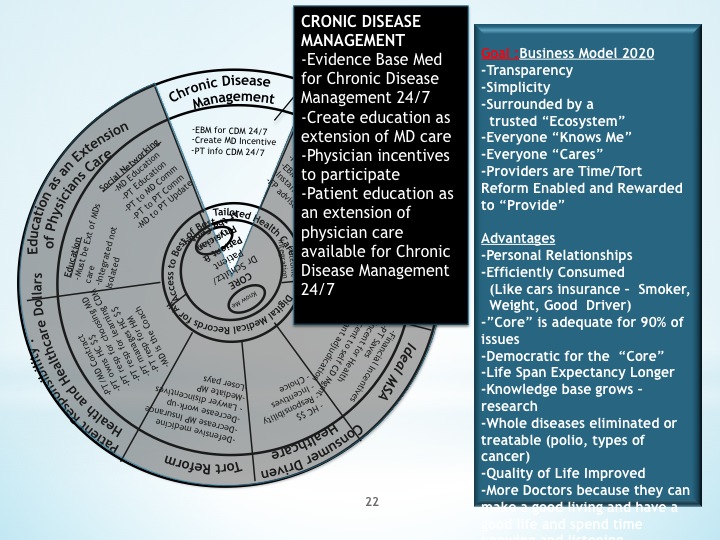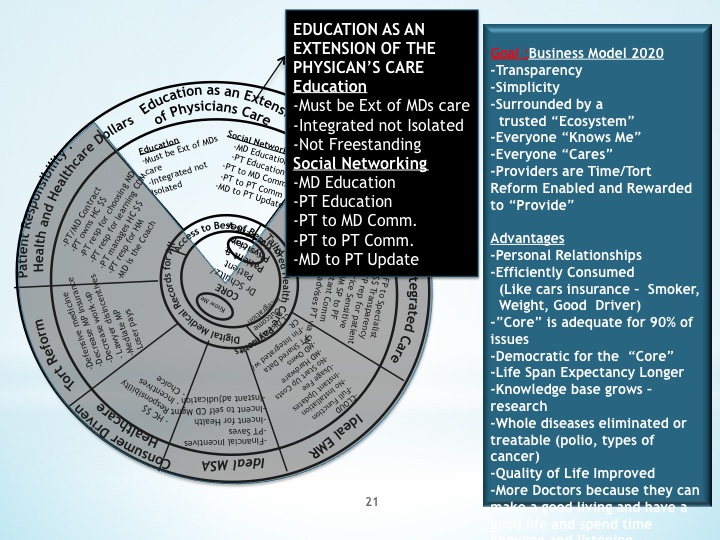Spokes 5 and 6- Future State Of Healthcare Business Model
Stanley Feld M.D.,FACP,MACE
Spokes 5 and 6 of future state business model for the healthcare system’s survival must be understood as one unit. Chronic Disease Management and Education As An Extension Of The Physicians Care are two simple concepts.
Patient education is a crucial element in the care of patients whether the disease is acute or chronic. Systems must be set up so that education is an extension of the physician’s care in order to be effective.
Education is less effective if it is not personalized and unrelated to the patient’s physician.
Both concepts have been devalued by President Obama’s healthcare reform plan. The chronic disease management concept has been devalued with the administration’s pilot studies showing that chronic disease management programs do not decrease the quality of care or cost of care.
The pilot studies were conducted by freestanding clinics. The education was not an extension of the patient’s physician care. Medical care is a personalized endeavor that requires a personal relationship between patients and physicians.
At its core the quality of medical care is enhanced by a strong physician patient relationship. This relationship is critical to a successful patient outcome and decreases in the cost of medical care.
An analogous educational event happened to me in my junior year in high school.
I was on the high school baseball team. Baseball practice started in February. It rained and snowed a lot in New York City in February. If it rained we would practice in the gym. We couldn’t have baseball practice outside one day.
On that day the gym was taken. The baseball team was sent to the study hall the last period of the day. My year before geometry teacher was in charge of that particular study hall.
I was an excellent high school student. I never missed a question on a geometry test.
I loved my geometry teacher. It was easy for me to understand everything she taught. This was an example of a positive teacher student relationship.
I was taking trigonometry that spring term. The chairman of the math department was my teacher.
I had a poor relationship with that teacher. He was not enthusiastic about trigonometry.
He was detached from his students and their needs. He had no interest in relating to us.
I could not understand a thing he taught. I figured I could tolerate him. I thought I had to ability to learn the course directly from the textbook.
To my surprise I could not understand any of the concepts in trigonometry when I was studying at home. I was resigned to the fact that I was going to fail trigonometry.
My geometry teacher saw me in the study hall. She came up to me an asked me how I was doing. I told her I was going to fail trigonometry.
I could not stand Dr. B and I could not retain anything he taught. I also found it impossible to teach myself trigonometry from the text.
She asked me what period I had lunch and which period I had trigonometry. I had lunch the 5th period and trig the 6th period.
She said she taught trigonometry the 5th period and she could transfer me into her class and into 6th period lunch. She was also a student advisor.
Her words were as if a weight was lifted from my back. She said there was one problem. The departmental first quarter test in trigonometry was being given tomorrow. If you do not know anything you will fail. I said I understood.
After dinner I went into my room to study for the test. I started on page one of the text. Everything I read stuck. All of a sudden trigonometry was understandable and every trigonometry problem was easy to solve. All my anxiety about trigonometry melted away.
The next day I took the departmental test in my new 5th period trigonometry classroom. I got 100% on the trigonometry test. I received an A+ in trigonometry at the end of the semester and 100% on the New York Regent examination. I did not miss a trigonometry question the whole term.
This lesson stuck with me throughout my medical career. A positive physician patient relationship is just as powerful as the positive teacher student relationship. Both enable patients and students to reach their potential.
Obamacare is interfering and methodically destroying the ability to form a positive patient physician relationship.
The regulations are punitive. Patient care is becoming depersonalized and commoditized.
I predict Obamacare is going to make the medical outcomes worse and the cost of healthcare higher.
After 30 years of practicing Clinical Endocrinology I am convinced that the therapeutic effect of the patient physician relationship is a major factor contributing to the healing process.
Chronic disease management does not work unless the patient physician relationship is intact.
President Obama has proven this with his pilot studies in chronic disease management.
President Obama has not proven that chronic disease management as an extension of physicians care does not work.
Combined with a positive patient-physician relationship, chronic disease management with education as an extension of the physicians care can work. Patients can be motivated to maintain control of their disease. Patients controlling their disease will decrease the complications, morbidity and mortality of the chronic disease.
The result will be a decrease in the cost of healthcare.
The opinions expressed in the blog “Repairing The Healthcare System” is, mine and mine alone
Please send the blog to a friend


Education Management Software • March 5, 2012
Do yourself a favor and learn them while you’re young. They have a lot of practical applications, including remembering people’s names.
Practice Management Software • April 13, 2012
A lot of what you say is absolutely correct. It’s no use longing for the better “old” days ’cause there was no such thing. It was precisely becuase there was a problem with healthcare, that Obamacare became a reality. Yes, the doctor-patient relationship is sacred, but at whose expense? If the patient has no respect for the associated costs, takes little, if any, responsibility for his/her healthcare, the burden falls elsewhere. Despite our increasing standards of living, healthcare cost increases has seen no abatement. I see Obamacare as an attempt to do something about this. We do not have unlimited resources, even though healthcare is a basic human right.